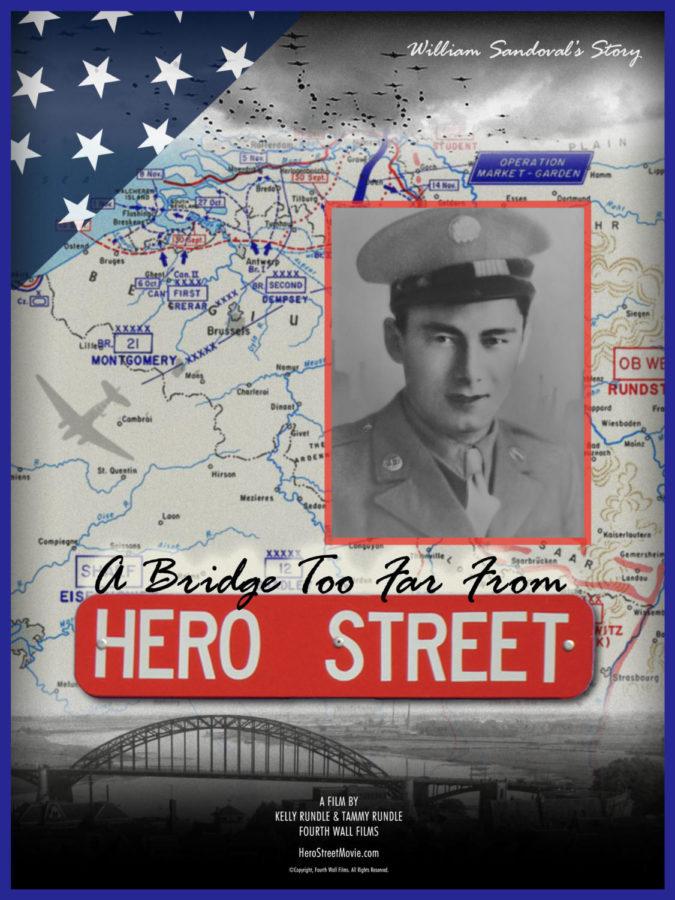Iowa State professor takes part in documentary series
The film “A Bridge Too Far From Hero Street — William Sandoval’s Story” tells the story of Pvt. William Sandoval during Operation Market Garden.
November 10, 2019
One Iowa State professor was a key interview for a documentary film series.
Brian Behnken is an associate professor of history and Latino studies at Iowa State and is a key interview in the documentary film series “Hero Street.” Two of the films in the series premiered Sunday at the Putnam National Geographic Giant Screen in Davenport, Iowa.
Behnken joined several scholars to take part in the first in the series, “Riding the Rails to Hero Street” and “A Bridge Too Far From Hero Street — William Sandoval’s Story.”
The story of Pvt. William Sandoval’s involvement in the largest air assault in history is featured in the new film by documentary filmmakers Kelly and Tammy Rundle of Fourth Wall Films.
The double feature premiere included “Riding the Rails to Hero Street” and a question and answer with the filmmakers, Behnken and other film participants.
It was the attack on Pearl Harbor on Dec. 7, 1941, that motivated Sandoval and many others to enlist in the military.
At age 20, Sandoval completed his training and was assigned to Co. F, 504 Parachute Infantry Regiment, 82nd Airborne Division.
In September 1944, he became part of Operation Market Garden. In the wake of the successful D-Day operation and with an opportunity to take advantage of weakened German forces, Field Marshal Bernard Montgomery’s plan was for British and allied forces to capture several strategically important bridges in the Netherlands, creating a path to strike at the heart of Germany.
According to the press release, the largest air assault in history launched 2,023 troop transport planes and 478 gliders from 24 airfields carrying a total of 45,000 men. The day after his 21st birthday, Sandoval was one of 20,000 paratroopers who leaped into the sky over German occupied Holland.
Sandoval’s Co. F secured the Grave Bridge and then assisted in taking the bridge at Nijmegan.
The Operation Market Garden story was told in the Cornelius Ryan book “A Bridge too Far” and the 1977 Richard Attenborough directed Hollywood film based on that book.
The phrase “a bridge too far” was an alleged quote from Lieutenant-General Frederick Browning when he described the sprawling military endeavor’s failure to take the final bridge at Arnhem, the last means of escape for German forces in the Netherlands.
The death toll included 17,000 killed, wounded or missing. Sandoval was among them. He died on Oct. 6, 1944, near the border of Holland and Germany. His body was never recovered.
The Rundles’ “Hero Street,” a proposed ten-part documentary series, will explore the personal and family sagas behind eight heroes from Silvis, Illinois, and tell the story of an ongoing struggle to memorialize them.
Only a block and a half long, the street lost six men in World War II and two in the Korean War, more than any other street in America. Hero Street, as it is now known, has provided nearly 200 American military service members since World War II.
The Rundles’ Mid-America Emmy-nominated “Letters Home to Hero Street” (co-produced with WQPT) was the first film created for the series.
“Riding the Rails to Hero Street” also premiered at the event. The film explored the immigrants’ journey from Mexico to the Quad Cities in segregated communities known as Cook’s Point in Davenport, Holy City in Bettendorf, and the Chicago, Rock Island and Pacific Railroad train yard in Silvis, Illinois.
Each film is designed to be viewed on its own or with the other films in the series.
Fourth Wall Films is an award-winning independent film production company formerly located in Los Angeles, and now based in Moline, Illinois.

















